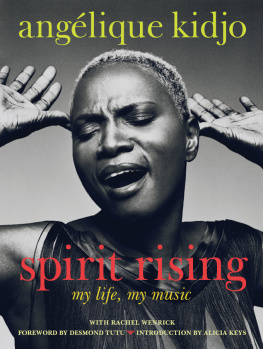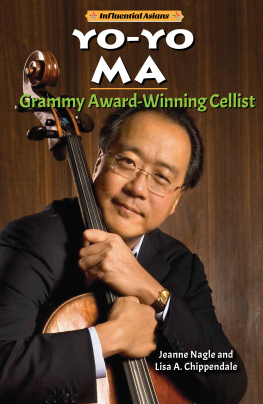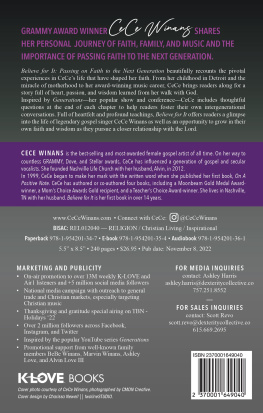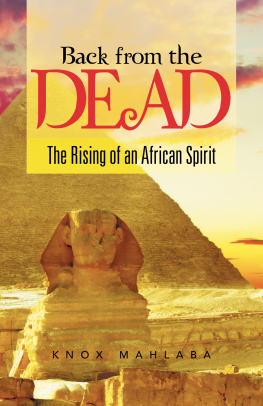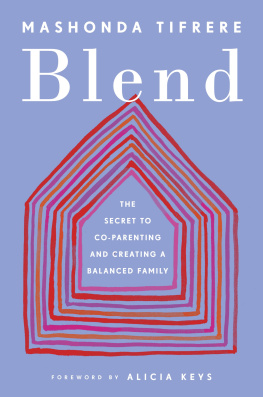
The photo used on the cover of .
Razor & Tie
In memory of my father, who stood up and sent all his daughters to school.

My dad and I in 2004.
Courtesy of Anglique Kidjo
CONTENTS

The road to Ouidah.
Sophie Langlois

With Desmond Tutu in New York in 2003.
PatrickMcMullan.com
I lived in an apartheid ghetto. On one occasion with friends I went to see the film Stormy Weather with its all-black cast. It did wonders for our psyches to see people of the same skin color as ourselves performing on the silver screen. That was when I saw my first pinup girl, the stunningly beautiful Lena Horne, who sang like a nightingale. Much, much, later when I was an adult, I found my second pinup, Aung San Suu Kyi of Burma. I had imagined that that was it. But noI have been bowled over by my third pinup, Anglique Kidjo of Benin.
She too is beautiful, yes. And can she sing? She has an amazing voice that takes possession of her whole being. She glides on the stage, and her song takes possession of her body, which twirls and turns amazingly, and it all makes her audience want to join her as they sway to the beat of her music. And often they do, or she joins them where they have been sitting. She is an international star who has appeared on the stage of Carnegie Hall. She has won a Grammy and international acclaim.
It is amazing all the glitter, glamour, and acclaim. She started her career almost accidentally. Her mother ran a traditional drama group in their hometown of Cotonou. Once when a child singer-actor was absent, ill, her mother grabbed her own child Anglique, dressed her in a costume and almost pushed her onto the stage and ordered her to sing. She did, and as they say, the rest is history.
Anglique was smuggled out of her home country ruled by a dictator and went to France. Things were tough but eventually she succeeded, and how! She embodies her creed that girls can succeed if given a chance, if they stay in school as long as possible and are not turned into child brides, that Africa is not just that continent of disasters and famine and drought, inducing donor fatigue. No, Africa has produced great musicians, thinkers, and leaders. Hard as it might be to believe, this Africa now producing so many refugees once gave refuge to others. Abraham and Sarah went to Africa to escape a famine in Canaan, as did Jacob, and the Holy Family, Joseph, Mary, and the infant Jesus, who fled to Egypt to escape the wrath of King Herod. It was a man from Cyrene, in Africa, who helped Jesus carry his cross on the first Good Friday. Some of Christianitys early thinkers came from Africa: St. Augustine of Hippo with his massive intellect; St. Athanasius of Alexandria; and St. Anthony of Egypt, the founder of the religious life. There have been leaders such as Julius Nyerere of Tanzania, and the universally acclaimed Nelson Mandela, the global icon of magnanimity and reconciliation.
Anglique was herself inspired by Miriam Makeba, Mother Africa, and she in her turn is now an inspiration to others with her message that, yes, the sky is the limit, and she urges them to reach for the stars. She has used her fame wonderfully to promote her ideals, which are universal ideals, and has often been a human rights advocatespectacularly in a concert in Harare, Zimbabwe, when she electrified her audience by lambasting Robert Mugabe for bringing a great country to its knees.
So you can see why she is my pinup, if she will pardon the expression. I pray that she continues to inspire others to emulate her, and yes, to reach for the stars because the sky is the limit.
Desmond Tutu

Singing with Alicia Keys at the first Keep A Child Alive benefit, in 2004.
Matthew Peyton/Getty Images
I remember the very first time I saw Anglique Kidjo perform in Africa. I had made a trip to South Africa with Leigh Blake, who first helped me learn about the depth and complexity of the AIDS pandemic and with whom I had founded Keep a Child Alive. We did many things while we were there. We went to clinics. We visited with teenagers who were orphaned because they had lost their parents to AIDS. We met people who were working on the ground with organizations. And, one night, we went to see Anglique.
She was singing at Newton Music Centre, a club in Johannesburg. Leigh and I went to talk to her backstage before the show. She left me slightly in shock because Anglique is so powerful and blunt and loud and just stunning in all her queendom. She is funny and a firecracker, and at first, I was taken aback by her energy. Its almost aggressive in its nature. I thought, What tornado did I just walk through? This woman infuses electricity into every space she enters.
When she went onstage, that same kind of energy followed her. It was a transformative night for me because while I was there trying to help with the devastating impact of AIDS in Africa, here was this beautiful African artist who was so spectacular. She brought it all together for me, because within Anglique lies all of Africa, its triumph and its tragedy.
Years later, Anglique and I went together to Alexandria Township to visit the gogos , grandmothers whose children had died in the pandemic. These women are raising their grandchildrenlittle ones, sometimes five in a family. Theres this big generation gap, and saying it is not easy for them is a tremendous understatement. We sat with them under a tree and we sang together, and after a while, Anglique walked away. When I found her, she had tears in her eyes and she asked me, How can we be letting this happen? What can we do? She was very present in that moment, allowing herself to be swept away. We hugged each other, and it didnt matter where I grew up or where she grew up. It was beyond all that. It was beyond music, even. Nothing else mattered. Instead, it was about humanity: what can we do to help? Thats the spirit of her energy. Sometimes you meet someone and you instantly understand each other. That was our case.
A few years later we performed together at Radio City Music Hall for Nelson Mandelas birthday celebration. At events like that, I think Anglique and I find ourselves experiencing similar feelings of disbelief. Its not that you dont deserve to be there. Youve put in the time and the work, but looking up to a legend like Aretha Franklin and being surrounded by the legacy of Nelson Mandela, I think we both found ourselves wondering, How did we get here?
You know how it is when youre in a particular moment and you experience that feeling of awe, almost in a childlike sense? Like when its only you and your sister in your room, and youre jumping up and down and giggling together? On that stage, that night, Anglique and I formed a bond of sisterhood. Not only did the music make us feel that way, but spiritually we connected too.
Anglique Kidjo embodies womanhood and bravery, as evident by her remarkable advocacy for children as a United Nations Ambassador. She pushes back against any stereotype that gets in her way. In reading her story, I am reminded that were all human beings together in the struggle, and that we have the power to move forward under any circumstance. I like to tell people that if you dont know Anglique, you havent lived because theres not one person who would be in her presence and not be changed.

